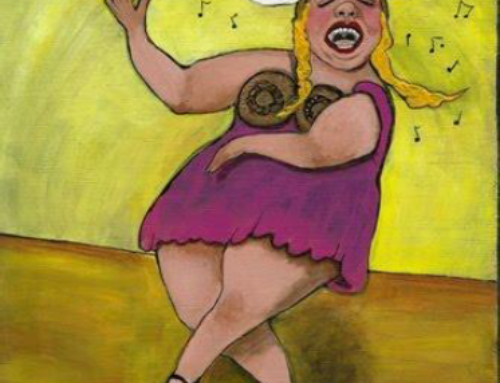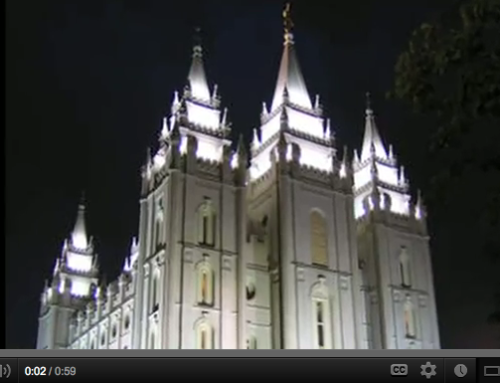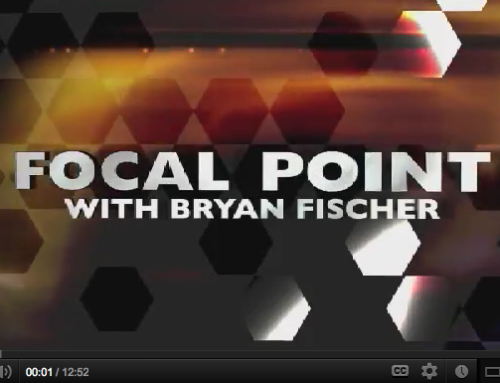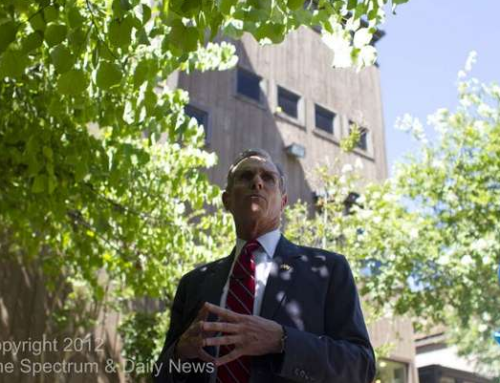
Crashing the party: Republican strategist turned gay rights activist ponders a White House run
By Dan Zak
Washington Post Staff Writer
Thursday, February 3, 2011
For link to story, Click Here
ON ROUTE 202, N.H. — The candidate can’t find his lane. The road is a crunchy carpet of snow. The candidate drifts too far to the right. The rumble strip rattles his car. The candidate drifts too far to the left.
“I can’t tell where — ” he says, squinting into the swirling void.
“We’re in the middle of the road,” says his research assistant calmly.
The car stereo belts the Act 1 finale from the Broadway musical “Wicked,” which is about the Wicked Witch of the West and how she chose Evil to get ahead but then chose Good because that’s how all fables end.
The candidate — the man behind the wheel, the man who can’t find his lane — is a guy named Fred. He’s exploring the possibility of running for president of the United States.

Fred Karger campaigns at a town hall meeting in Keene, NH. Karger is considering a presidential run as an openly gay Republican candidate.
He is doing this as an openly gay Republican who’s never held elective office, using money he amassed as a conservative consultant who helped torpedo Michael Dukakis with the Willie Horton ads in 1988 and worked for the tobacco industry to stave off smoking bans in California in the ’90s.
Fred Karger, 61, is a nice guy.
He wants his country to see that. He wants young gay people to see him run for president. He’d be the first-ever openly gay presidential candidate for a major party if he formally declares. He can see himself as the moderate voice in a debate crowded with hard-liners.
He has visited New Hampshire more than any other presidential prospector in this young election cycle. This skiddy late-night ride from a gathering in Keene to his Concord hotel is part of his 11th trip to the state in the past year. He’s slingshotting around, hosting tiny town halls, collecting volunteers one by one and arranging coffee dates with policy experts, academics and state politicians.
This is not a stunt, Fred insists.
* * *
A vital and misleading amendment to the American dream is “Anyone Can Grow Up to Be President.”
The reality, of course, is that anyone can run for president. Initially, it costs $0, plus the time required to file with the Federal Election Commission. The list of 2008 presidential candidates is 366 people long. It includes Hillary Rodham Clinton (Democratic Party), who’s followed by Temperance Alesha Lance-Council (party: Unknown); Rudolph W. Giuliani is just ahead of His Royal Majesty Caesar St. Augustine de Buonaparte, who, according to news clippings, declared himself emperor of the United States in 1996.
But to become president, one needs money (Barack Obama raised over half a billion dollars) and mantras (“change,” “hope,” etc.) and the media (your message here).
Fred has frisbees.
And stickers featuring his slightly airbrushed face. Fred has retirement money, which he’s burning at a rate of between $20,000 and $30,000 a month on his almost-campaign. And T-shirts featuring a New Hampshire license plate that reads “FRED WHO?” And customized pins that cross the American flag with the rainbow one.

Fred Karger and campaign aide Kevin Miniter raise one of his “Fred Who” banners.
And Fred has pizza. Where there is pizza, there are college students.
He draws 25 of them to a basement meeting room at the University of New Hampshire in Durham last Tuesday, and about a dozen Dartmouth College Republicans to a conference room in Hanover the following night. His tortoiseshell glasses, gray wool suits and previous acting experience might win him a walk-on part as John Slattery’s older brother on “Mad Men.” He runs through his biography, outlines his rickety platform (a 28th amendment to lower the voting age, education reform to make school “more interesting”) and compares himself to Shirley Chisholm, the first black woman elected to Congress, who ran for president in 1972.
Chisholm : Obama :: Fred : The first openly gay president of the United States.
“I know this sounds crazy,” he acknowledges to the students, who regard him with arched eyebrows and the occasional nod. “Why am I here?”
Because the GOP needs a pro-choice, antiwar, freedom-for-all, spendthrift compromiser inspired by Nelson Rockefeller and Teddy Roosevelt, he says.
The actual delivery of this message isn’t as clean. His stump speech is more of a meander that always boomerangs back to his retirement hobby: crusading against Prop 8, the Mormon Church and the National Organization for Marriage.
The students who show up for Fred seem nostalgic for a big-tent GOP they haven’t experienced in their lifetimes. But the tent Fred imagines may be a little too big.
“I think he’s a fascinating candidate,” says Dartmouth senior Katie Pine, 21, a government major who stopped by the Hanover event because she wonders where all the moderates have gone. “He’s charming and charismatic, but he sounds like a Democrat to me.”
“I consider myself a moderate like my boss and mentor, Ronald Reagan,” Fred is fond of saying. “You’re never going to agree 100 percent with any candidate. I’m more toward the center, and New Hampshire is a centrist state.”
It also rewards long-shot candidates who log miles and shake hands. Jimmy Carter, a virtual unknown before the 1976 campaign, turned New Hampshire into a launching pad with a “Jimmy Who?” strategy. Pat Buchanan, who’d never been elected to public office, won the primary in 1996. John McCain and Hillary Clinton, hampered by establishment baggage, staged comebacks here in 2008 by dropping their guards and reveling in retail politics.
That’s what Fred is doing. His goal is to get into a debate and nudge the GOP’s conversation, like Rep. Ron Paul (R-Tex.) did in 2008. He wants to make other candidates answer for their statements (or lack thereof) on gay rights. He wants to crash the party.
* * *
On April 10, 1972, Fred ganked a security badge, talked his way into the Dorothy Chandler Pavilion in Los Angeles and walked onstage with a herd of celebrities to salute Charlie Chaplin. Fred stood between Raquel Welch and Ann-Margret as the silent film star received an honorary Oscar.
Typical Fred. Fred likes a challenge, and the spotlight. He likes to find a way around the word “no,” to network above his paygrade. As a high schooler growing up in Glencoe, Ill., Fred would dress up, take the train into Chicago, waltz into formal banquets and enjoy a fancy meal as if he belonged.
“He loved to be the center of attention, but also the engineer behind the scenes,” says his good friend Gary Wolfson, who attended high school and the University of Denver with Fred. “He always tells people he was a class clown. I think of him more as the class instigator.”
He wasn’t a standout student or athlete, but his Eddie Haskell nature was a fit for politics. He phone-banked for Nelson Rockefeller’s 1964 presidential campaign and worked for Charles Percy’s 1966 and 1972 Senate campaigns. Intent on cloaking his sexuality from his Chicago life, he bought a red Cougar convertible at age 23 and drove it to Los Angeles under the guise of becoming an actor.
In a span of three years, he was a passenger in “Airport 1975” and a model for an Edge shaving cream commercial directed by John Hughes, and he won a recurring role on a “Welcome Back, Kotter” spinoff that never aired.
His heart was in politics, though, and he got a foot in the door at the Dolphin Group, a feared and revered consulting firm for conservative candidates and causes. For 27 years he specialized in opposition research, digging up unsavory facts that could sink opponents and sway public opinion. He worked on Reagan’s ’80 and ’84 campaigns alongside firebrand Lee Atwater. He toured the relatives of William Horton’s victims around the country in ’88 to spin an exaggerated narrative about Dukakis’s stance on crime. Fred fought anti-smoking ordinances for big tobacco in the ’90s by peddling polling data that was criticized by some elected officials and academics for being unscientific and deceptive.
“Fred doesn’t smoke, but he would show up at these Philip Morris-related events with a fake cigarette in his mouth, kind of tongue-and-cheek, keeping a sense of humor,” says Nicholas Thimmesch II, a senior writer in the Reagan administration and longtime Washington media consultant. “He may not even have thought smoking was a good thing, but he did believe Philip Morris had a legitimate gripe against ridiculous tobacco lawsuits and restaurant smoking bans. I think Fred embraces freedom, and that goes for the freedom to be married.”
But he led a double life for decades: Savvy, straight-acting strategist at work, gay man who had long-term relationships and wrote checks to LGBT causes at home.
“It was hell,” Fred says. “I was so uncomfortable and so cautious. . . . I would go to gay pride parades and always look for cameras, and hide in the background. I had a fit if my picture was taken.”
These two lives didn’t unite until a couple of years after he retired at age 53. He wanted to “give back” and do something “significant,” so in 2006 he organized a local coalition to save a historic gay bar near his residence in Laguna Beach, Calif. In 2008 he formed the nonprofit Californians Against Hate to battle Proposition 8, the state constitutional amendment banning same-sex marriage. He used his opposition-research skills to launch a boycott of San Diego hotelier Doug Manchester and shame the Mormon Church for funneling cash to advance Prop 8.
“Fred in his fiber understands coalition building and leverage,” says Rick Jacobs, chairman of the Courage Campaign, an equality advocacy organization in California. “One of the reasons I think his presidential candidacy is a little less than quixotic is because he’s so focused, so good at getting his message out.. . . If you mix together someone who really knows politics and has a point to make, and someone who’s a relentless optimist, how do you dismiss that?”
During the Prop 8 fight, he divined the ultimate party crash, the splashiest way to make a point, the biggest idea of all: a run at the White House. He crashed the Southern Republican Leadership Conference in April to announce the possibility of his candidacy. In July he incorporated his exploratory committee and started meeting with the leadership of any LGBT, Democratic or Republican organization who would see him.
“This is uncharted territory,” says R. Clarke Cooper, executive director of the Log Cabin Republicans. “From a historic standpoint, you could look at his candidacy as a bridging of different generations. . . . Maybe his mere presence will tone down potential rhetoric. It’s very difficult for someone to talk negatively about another person or entity if they’re in the room.”
But Fred is most comfortable when there’s an enemy to fight. For years, the opposition was his candidate’s challenger or his client’s economic foe. These days, his chosen nemesis is Brian Brown, executive director for the National Organization for Marriage, which is pushing for a repeal of New Hampshire’s same-sex marriage bill now that the state house has a Republican supermajority.
The timing is perfect, Fred says. The repeal effort will likely crescendo as 2011 turns to 2012. By then he’ll have dug his trenches in New Hampshire, adopting local and state issues as his own: He’s keeping tabs on businesses affected by the planned closure of the Sagamore Bridge in Portsmouth, and last week he released a commercial warning the state of NOM’s repeal tactics.

Karger talks to citizens at the Golden Egg, a diner in Portsmouth, N.H., about his potential presidential candidacy and the planned closure of the nearby Sagamore Bridge, a vital conduit for commerce.
“History has proven that time spent here equals primary votes,” says New Hampshire strategist Mike Dennehy, John McCain’s national political director in ’08. “With the exception of Mitt Romney, Sarah Palin and Newt Gingrich, most of the possible candidates have next to no name recognition in the state and are starting at about the same level [as Fred]. . . . There are significant amount of center and left-of-center Republicans here who I think would be open to a candidacy like Fred’s.”
There is one small problem. When people ask Fred how he’d balance the budget, he smiles and steers the subject back to gay marriage and NOM and the Mormons. When people ask him how he’d fix health care, he says “I still need to look into it.” There is something refreshing — if entirely unpresidential — about his in-progress grasp of issues. After a lifetime of faking it, he’s finally not.
It’s for voters to judge the merits of his gambit, to determine if it’s worthy of the presidential nominating process, or if it’s merely the brilliant tactic of a seasoned operative who’s fixated on a single issue rather than a whole country.
* * *
I really think of him as a Republican Harvey Milk. He’s very funny and very smart and has a great ability to connect with all kinds of people. . . . There’s not the slightest possibility that Fred Karger is going to become president, but if he could be part of that dialogue — I see real value in that.
— Cleve Jones, gay rights activist
A total farce . . . unconstructive . . . unstrategic . . . self-absorbed . . . a fantasy . . . neither thoughtful nor conservative . . . We don’t want to be special. And Fred’s campaign is calling attention to the fact that he’s special.
— a sampling of how some representatives of gay rights organizations describe Karger’s presidential ambitions
* * *
In 48 hours he’s hit two college campuses, a Mexican restaurant in Keene, a radio station in Manchester and Portsmouth’s Golden Egg diner, where candidates of yore have poured coffee to demonstrate their folksiness. Under a leaden sky frozen by single-digit temperatures, Fred zips around in a slush-spattered Lincoln Navigator, passing homes crowned with icicles, trailing a red rolling duffle bag full of frisbees and T-shirts.

Radio host Charlie Sherman at WGIR in Manchester, N.H., interviews Karger.
He’s shadowed by his full-time research assistant, 27-year-old Los Angeles resident Kevin Miniter, who was captivated by the notion of transpartisanship, which allows a politician to revere the Clintons (Fred was a maxed-out Hillary donor in 2008), espouse the word “progressive,” vote for Ralph Nader in 2004 (to protest George W. Bush) and 2008 (to protest Obama), and still call himself a Republican.
“I remember thinking ‘This is genius,’ and I immediately got what he’s trying to do: He wants to change the political dialogue,” says Miniter, who met Fred last year at a fundraiser.
The country keeps time by its pendulous centrists. In the midterm elections in November, 31 percent of self-identified gays and lesbians voted Republican, up from 24 percent in 2006. Forty-two percent of all voters in New Hampshire are “undeclared,” or independent. These are the people Fred’s counting on, the people who show up to his events.
“The Republican Party has gotta be tweaked,” says retiree and independent Kevin Healy at a Portsmouth gathering hosted by a friend of Fred’s. “They need to focus on issues, not ideology. . . . [Fred is] kind of an equivalent to a Mama Grizzly. He’s a Grizzly Gay.”
At the Golden Egg , retired accountants Sheldon and Doreen Kaplan praise Fred’s sentiment but remain suspicious of his lack of executive experience.
“We’re the people in the middle no one cares about,” says Sheldon, a Clinton Democrat who voted for Sen. Kelly Ayotte (R-N.H.). “I’m not voting for [Obama]. I want someone who won’t change his stripes.”
Fred, of course, changed his stripes. He propped up an establishment that was unfriendly to gay rights and then burst out of the closet into a possible presidential run. To some, this sounds like penance.
He doesn’t see it this way. He says he was supportive of gay rights anonymously all along, and that if he decides to run for president he will be a candidate for everyone, not just gays who want to quash the National Organization for Marriage.
“It’s much more meaningful than that,” he says. “I want to be a messenger for my community within the public discussion. . . . I may ask every Republican looking at running to go have lunch, to meet and chat. If I can make headway with someone running for president, and be perceived as ‘just another guy,’ I think I would’ve accomplished something.”
Though dry and didactic on the stump, Fred’s a winsome shmoozer. At the Conservative Political Action Conference in Washington next week, he plans to ingratiate himself with conservatives, the media and other potential candidates like Tim Pawlenty, Rick Santorum and Texas Gov. Rick Perry. He’s struggling to get into a March 7 candidate forum in Iowa, where the state’s Republican National Committeeman vowed to “work overtime” to extinguish his “radical homosexual” candidacy. He’s awaiting the criteria to participate in the May 2 debate at the Reagan Library in California. He’s hoping donations take the weight off his wallet by the spring (his first official fundraiser at his second home in Laurel Canyon, Calif., netted $10,000 Sunday night, and his goal for the campaign is a “frugal” $5 million).
By the spring he plans to rent a five-bedroom house in the north end of Manchester to establish a headquarters for campaign precinct walks. The only thing that stands between his name and the New Hampshire primary ballot is a $1,000 fee. Anyone, after all, can run for president.
This is crazy, Fred knows, but he’s never felt more sane.



